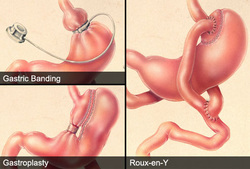
Preganancy and Bariatric Surgery
Scientists in The Uk recently performed a materials evaluation that exposed women should wait a minimum of 12 weeks after weight reduction surgery before attempting to conceive.
The evaluation assessed the benefits, security, and issues of bariatric surgery. It also checked out the multidisciplinary management of individuals prior to, during, and after pregnancy. The results of the evaluation were recently highlighted in The Gynaecologist and Obstetrician.
"An increasing amount of females of child-bearing age are experiencing bariatric surgery processes and demand advice and assistance regarding reproductive problems. In light of present prove available, pregnancy after weight loss surgery is safer, with less complications, than pregnancy in morbidly obese women.
Multidisciplinary input signal treatment could be the important to a healthier pregnancy for girls who have experienced weight-los surgery," mentioned the review's co-author Rahat Khan, at Princess Alexandra Hospital NHS Trust, in a prepared declaration. "However, this quantity of women should nevertheless be considered high-risk by both doctors and doctors."
As obesity continues to be increasing among females of reproductive age the research is of significance. The scientists mentioned the price of obesity might shift from 24.2 percent in 2005 to 28.3 percent in 2015 for that specific market.
The evaluation assessed the benefits, security, and issues of bariatric surgery. It also checked out the multidisciplinary management of individuals prior to, during, and after pregnancy. The results of the evaluation were recently highlighted in The Gynaecologist and Obstetrician.
"An increasing amount of females of child-bearing age are experiencing bariatric surgery processes and demand advice and assistance regarding reproductive problems. In light of present prove available, pregnancy after weight loss surgery is safer, with less complications, than pregnancy in morbidly obese women.
Multidisciplinary input signal treatment could be the important to a healthier pregnancy for girls who have experienced weight-los surgery," mentioned the review's co-author Rahat Khan, at Princess Alexandra Hospital NHS Trust, in a prepared declaration. "However, this quantity of women should nevertheless be considered high-risk by both doctors and doctors."
As obesity continues to be increasing among females of reproductive age the research is of significance. The scientists mentioned the price of obesity might shift from 24.2 percent in 2005 to 28.3 percent in 2015 for that specific market.

In addition they discovered the amount of women having bariatric surgery was increasing, but obesity may raise the danger of potential obstetric complications. As a result, the scientists think pregnancy is safer for girls who have experienced bariatric surgery, as in comparison to women who are morbidly overweight. Particularly, a previous research demonstrated pregnancies are safe for 79.2% of individuals pursuing weight loss surgery.
However, the scientists noted there may be medical problems during pregnancy that additionally outcome after bariatric surgery. A research found there may be band slippage and migration, which causes negative effects like band and throwing up loss.
On the basis of the present evidence, scientists also suggested persons must not try to conceive for no less than 12 weeks after undergoing bariatric research. Particularly, a research revealed there is a greater rate of natural miscarriage for women who became pregnant within 18 weeks (31%) when compared with women who became pregnant 18 months after starting weight reduction surgery (18%).
Thanks to these results, women were advised by the researchers to check with their doctors on problems related to nutrition, contraception, weight gain, and supplementation prior to conceiving.
"Increasingly, obstetricians, surgeons and primary care physicians may be asked to deal with concerns presented by their sufferers regarding the safety of pregnancy after weight reduction surgery," continued Khan in the declaration.
For there to be considered a healthier maternal and neonatal outcome after weight loss operation, patients are recommended to use a multidisciplinary group composed of anesthetists, fertility specialists, nutritionists, doctors, psychologists, primary care physicians, and doctors prior to, during, and after pregnancy.
"Best instruction ought to be motivated in these persons to enable them to make knowledgeable choices about planning pregnancy after their operation," said Jason Waugh, TOG's Editor-in Chief, in the declaration.
However, the scientists noted there may be medical problems during pregnancy that additionally outcome after bariatric surgery. A research found there may be band slippage and migration, which causes negative effects like band and throwing up loss.
On the basis of the present evidence, scientists also suggested persons must not try to conceive for no less than 12 weeks after undergoing bariatric research. Particularly, a research revealed there is a greater rate of natural miscarriage for women who became pregnant within 18 weeks (31%) when compared with women who became pregnant 18 months after starting weight reduction surgery (18%).
Thanks to these results, women were advised by the researchers to check with their doctors on problems related to nutrition, contraception, weight gain, and supplementation prior to conceiving.
"Increasingly, obstetricians, surgeons and primary care physicians may be asked to deal with concerns presented by their sufferers regarding the safety of pregnancy after weight reduction surgery," continued Khan in the declaration.
For there to be considered a healthier maternal and neonatal outcome after weight loss operation, patients are recommended to use a multidisciplinary group composed of anesthetists, fertility specialists, nutritionists, doctors, psychologists, primary care physicians, and doctors prior to, during, and after pregnancy.
"Best instruction ought to be motivated in these persons to enable them to make knowledgeable choices about planning pregnancy after their operation," said Jason Waugh, TOG's Editor-in Chief, in the declaration.
 RSS Feed
RSS Feed